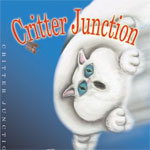Dear Reader,
I received the best ever New Year’s letter; not your usual New Year’s letter, not a “look-what-my-kids-accomplished-and-I’ll-bet-it-makes-you-feel-inadequate” letter, or an “all-the-places-to-which-I-traveled-while-you-were-stuck-in-a-rut” letter, or even a “Bert-had-his-gall-bladder-removed-but-his-gout-is-improving” letter, but poet Carolyn Jennings’ “The Soft Heart of Hard Times” poem letter. An “it-takes-more-than-a-stroke-to-squelch-a-sense-of-humor” well-written letter. With Carolyn’s help, there’s hope for future letters like these.
Carolyn has graciously given me permission to share her poem as my New Year’s gift to you.
THE SOFT HEART OF HARD TIMES
When my husband’s mother had a stroke,
much that had once seemed her
was gone. She has learned to walk again—
not fast, not far. She has learned to talk
again—not stories, not memories.
She no longer whips up batches of fudge
before our visits, doesn’t shop the catalogs
for months before Christmas for the grandkids,
won’t be sewing stockings by hand and can’t zip
together the turkey feast that filled holidays
and the entire dining table, all the leafs added.
Last Christmas my father-in-law helped her to the table
where my husband cut her slice of turkey into bite-size pieces.
We call on Sunday afternoons. Most of the talk
is ours. Her sentences dangle unfinished.
But “thank you” and “wonderful” dance
through almost every line she speaks.
We hear no words of complaint,
despair or fear. The sly humor spawned
during a childhood picking cotton
and raising younger siblings in a four-room
home packed with nine kids
continues today in her laughter weaving
through all conversations, a warm shawl
that stretches from Texas to Colorado.
When family visits, her face lights up
like a Christmas tree. Her playful spirit spins
TV ads and my clumsy attempts to cook in her kitchen
into gentle giggling simmering through the day
like a pot of soup on the burner.
On Mother’s Day when I told her I loved her
and was glad she’s my mother-in-law,
she said, “I’m glad you’re my sister.”
She caught the mistake, paused, couldn’t find
the word “daughter-in-law, but she giggled―
eyes as full of delight as when she years ago hoodwinked me
into decorating for my own birthday surprise―
and she said in her soft Texas drawl,
“Well, whoever you are, I love you too!”
Carolyn Jennings ©2008
Here’s to a painfully poetic 2009!











